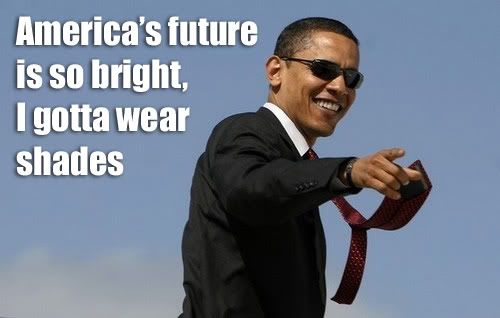Charles Franklin at pollster.com graphs voter turnout by age, which is worth a look given my recent obsession with the literal death of conservatism and growing support for gay marriage and marijuana legalization.

I have a theory that you spend your life listening to the music you liked when you were about 20. Note that the nostalgia curve runs about 20 years or one generation behind; "Happy Days" was the top show on TV in the `70s, there was a hippie revival in the late '80s that put the Grateful Dead in the top ten (hey, man, is that Freedom Rock?), and nostalgia caught up to me when Bowling for Soup released "1985" in 2004.
You can tell who ads are marketed at with the music: take the year the song was released, subtract 20, and that's the year your audience was born. The simplified cell phone aimed at seniors isn't called Jitterbug by accident; the dance peaked in the immediate pre-Elvis era. That denture ad that uses "Bye Bye Love" by the Everly Brothers? 1958 minus 20 equals 1938 or a target age of 71. Swiffer is moving to a slightly younger demographic by dropping 1978's "Baby Come Back" for 1982's "Don't You Want Me."
Much the same is true of politics. A look at the graph shows voting behavior peaking between ages 55 and 75. There's a key breaking point within that bracket. Conventional calculations have the Baby Boom starting at 1946, making those voters 62 in 2008. Their first presidential election would have been the tumultuous year of 1968.
My pre-boomer parents (75 and 73) would have first voted in 1956, the staid Ike-Stevenson rematch. And it's at the dawn of the boomers that support for marriage equality and drug decriminalization starts going up; the first boomers were 22 when Stonewall happened in `69.
There's a rapid dropoff in voting after about age 85 (World War II generation, born 1923; first votes in FDR vs. Dewey 1944), and that dropoff will push deeper into the pre-boomer generation with each passing year. The few Harding-Coolidge-Hoover Republican era voters who remain, whose voting peaked in the Nixon-Wallace backlash era, are now at least 101 years old.

Most demographers define the baby boom as 1946 to 1964, which makes me technically, just barely, a boomer (December `63). But I don't think you're a true boomer unless you remember JFK getting shot and the Beatles on Ed Sullivan. Some scholars refer to us as "shadow boomers," born between 1958 and 1965 or so. But that term has us eclipsed by the `60s. I prefer to think of us as "the Obama generation." The millenial generation born in the `80s might claim that term, but the president (August `61) is practically my peer. The boomers had their presidents with 1946-born Bill Clinton and Bush 43, now we've got ours. And much as I hate to say it, the Republicans have Palin, born two months after me on the very day the Beatles played their first U.S. concert.
Our sub-generation, 43 to 50 in 2008, still has some room for increased turnout. We're at about 65 percent, while the peak turnout at around age 65 (the cusp of pre-boomer and boomer) is closer to 75 percent. And as more and more of the electorate is made up of people who came of age after the `60s, those old culture war notes will resonate less and less.
The only question in my mind is about the Gen-Xers just younger than me, who grew up under Reagan. When I was a college freshman, the seniors were liberals; when I was a senior the freshmen were conservatives. But my gut feeling is that the W trainwreck shattered any loyalty they may have felt to the GOP.
The McCain vs. Obama election was symbolically perfect: pre-boomer McCain (1936), white and military, vs. shadow boomer Obama, multiracial and international. To cite a song of my generation: the future's so bright I gotta wear shades.
Hiç yorum yok:
Yorum Gönder